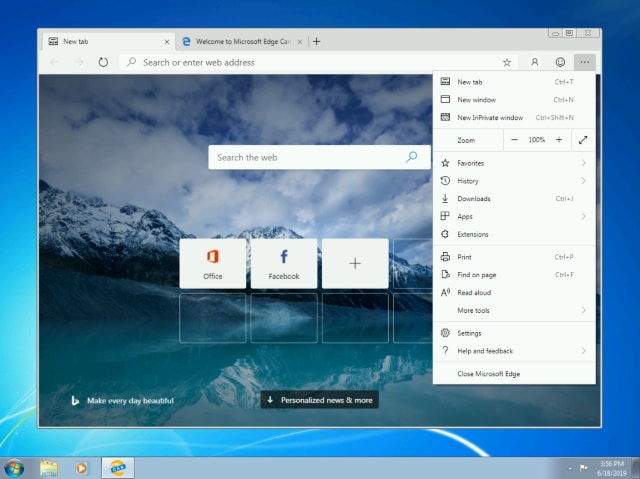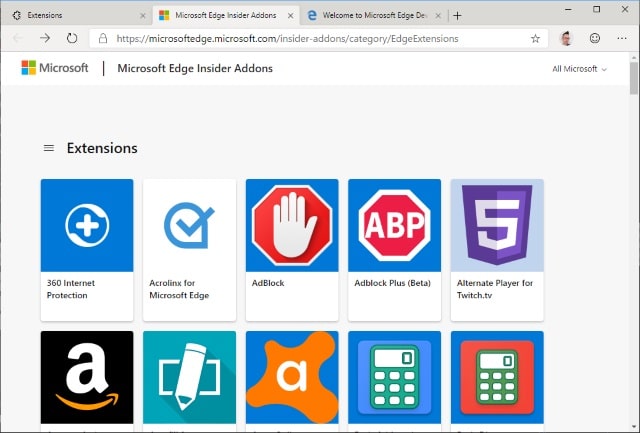
Microsoft releases Chromium-based Edge for Windows 7 and 8.x
After embracing the Chromium engine for Edge, Microsoft is gradually expanding the number of platforms the browser is available for.
Starting off as a Windows 10 browser and then spreading to macOS, there is currently talk of Linux being in Microsoft's sights. For now, however, it is Windows 7 and 8 users who are the latest to have Microsoft Edge available as a browser option.

Security software is causing Firefox users to lose saved passwords
Firefox users are reporting that their saved passwords have been lost, with the problem seemingly caused by antivirus software rather than being an issue with Firefox itself.
Antivirus software such as Avast and AVG appears to be corrupting the file in which Firefox stores passwords, rendering it unreadable. Thankfully, passwords can be recovered, but -- for the time being --- they will be corrupted again when you restart your computer.

Firefox unveils new-look logo and introduces new parent brand
Firefox has revealed its redesigned branding, including a new icon for its web browser, as well an introducing the logo for the new Firefox parent brand, some 18 months in the pipeline.
As well as a new look, the icon features an updated color palette which is not just about aesthetics, but also accessibility. There's also a new, modern typeface, as well as what's being described as a "new shape system".

Firefox Quantum 67 delivers better performance, protection and smattering of new features
Mozilla has released Firefox Quantum 67.0 for Windows, Mac and Linux, along with Firefox for Android 67.0.
The new release is a major one, boasting several performance improvements, a significant number of new features and tighter security and privacy with the ability to block both cryptominers and fingerprinters

Mozilla explains why Firefox add-ons stopped working... and how to fix the problem
Since late last night, Firefox users have been plagued with a problem that meant no add-ons were working. Extensions were disabled and users were unable to re-enable them, causing confusion and frustrationaround the world.
It turns out that that the reason Firefox add-ons stopped working is that a signing certificate expired. Having determined the cause of the problem, Mozilla has developed a fix for users of the desktop version of Firefox on the Release, Beta and Nightly channels. [UPDATE: Mozilla has released a new version of Firefox that fixes most problems for more users.]

Chromium-based Microsoft Edge pretends to be different browsers by switching user agent
The new Chromium-based version of Microsoft Edge has generated a good deal of attention, and an intriguing feature of the browser has been noticed that makes it all the more interesting.
It has been noted that Edge switches between user agents depending on the sites visited, effectively pretending to be a different web browser. This enables Edge to take advantage of web sites features designed for a specific browser.

Avast releases 'Aspen', its most secure browser to date
People tell us they are becoming increasingly wary of using third-party browsers such as those from Opera, Chrome and Firefox. It might come as a surprise, but many average users will opt to stick with their default OS browser, Edge, and a powerful security suite to keep themselves secure.
The question is, is this the most secure way of surfing the web in 2019? Could the connection between your computer and the internet be made more rock solid? Well, Avast certainly thinks so.

Opera 60 Reborn 3 promises to be Web3-ready with Crypto Wallet and revamped VPN
Opera Software has released Opera 60.0, a major new version of its web browser dubbed Reborn 3. The '3' is a partial reference to the browser’s support for Web3, the so-called decentralized "block-chain based internet of the future".
The new browser’s support for Web3 comes with a new Crypto Wallet to facilitate secure online identification and transactions. The browser’s free VPN service has also been overhauled along with a design refresh.

Microsoft Edge Insider Addons website launched
The first official builds of Chromium-based version of Microsoft Edge are now available to download, and Microsoft has also launched the Microsoft Edge Insider Addons website.
Anyone using the standard, non-Insider version of the browser is probably familiar with the addons and extensions that are available from the Microsoft Store for Edge. But with the new Chromium version of Edge, the new website gives an easy way to extend the capabilities of the Dev and Canary builds.

Mozilla is launching curated Recommended Extensions program this summer
However much you love your chosen web browser, you have probably enhanced its capabilities through the use of add-ons. Finding decent, reliable add-ons can be tricky, and this is why Mozilla is launching the Recommended Extensions program.
This editor-curated program will surface the very best vetted extensions for Firefox, and it is due to roll out in stages later this summer.

Vivaldi 2.4 expands customizability, introduces support for multiple user profiles
Opera R3 may be on the horizon, but the company’s ex-founder Jon von Tetzchner continues to reinvent the web browser for real with Vivaldi 2.4 for Windows, Mac and Linux.
Version 2.4’s main highlight is widened customization support for its toolbars in the form of being able to drag and drop selected buttons between Address and Status bars. Version 2.4 also introduces multi-user profile support to the GUI, improves its bookmark management tools and adds a calculator to the Quick Command tool.

Firefox Quantum 66 blocks audio autoplay, improves scrolling behavior and adds option to search all tabs
Mozilla has rolled out Firefox 66.0 for Windows, macOS and Linux, along with Firefox for Android 66.0.
The new release is light on new features, but heavy on delivering significant improvements across the browser. The big new addition is that websites will now automatically be blocked from playing sound -- however, the customizable feature won’t be immediately available to all users

New Windows Defender Application Guard add-ons for Chrome and Firefox open untrusted sites in Microsoft Edge
If you attempt to visit a bad site in Firefox or Chrome, your browser will often warn you, so you can decide whether or not to take the risk and continue to your destination.
Microsoft has joined the fight to prevent users unwittingly visiting bad sites by creating new extensions for Google and Mozilla’s browsers which automatically redirect users from untrusted sites to Windows Defender Application Guard for Microsoft Edge.

Block malware, ads, clickbait and more with Malwarebytes Browser Extension
Are you plagued by pop-ups, susceptible to online scams or just frustrated by ad-riddled web pages that take forever to load? If so, then Malwarebytes may have the browser extension for you.
Malwarebytes Browser Extension for Chrome 1.0.40 and Malwarebytes Browser Extension for Firefox 1.0.38 both promise to be the first browser add-ons to identify and block yet-to-be-identified fake scams and tactics, plus provide protection against popups, browser lockers and hijackers too.

Opera Touch 1.5.0 adds cookie dialog blocker to mark 24 improvements since launch
Opera Software has unveiled no fewer than 24 improvements since launching its mobile browser for Android and iOS. The latest build, Opera Touch 1.5.0 delivers a much-needed setting for automatically handling website cookie dialogs.
Other improvements since launch have included expanding the My Flow feature to connect mobile and desktop iterations of Opera, support for Private Browsing mode and a dark theme
